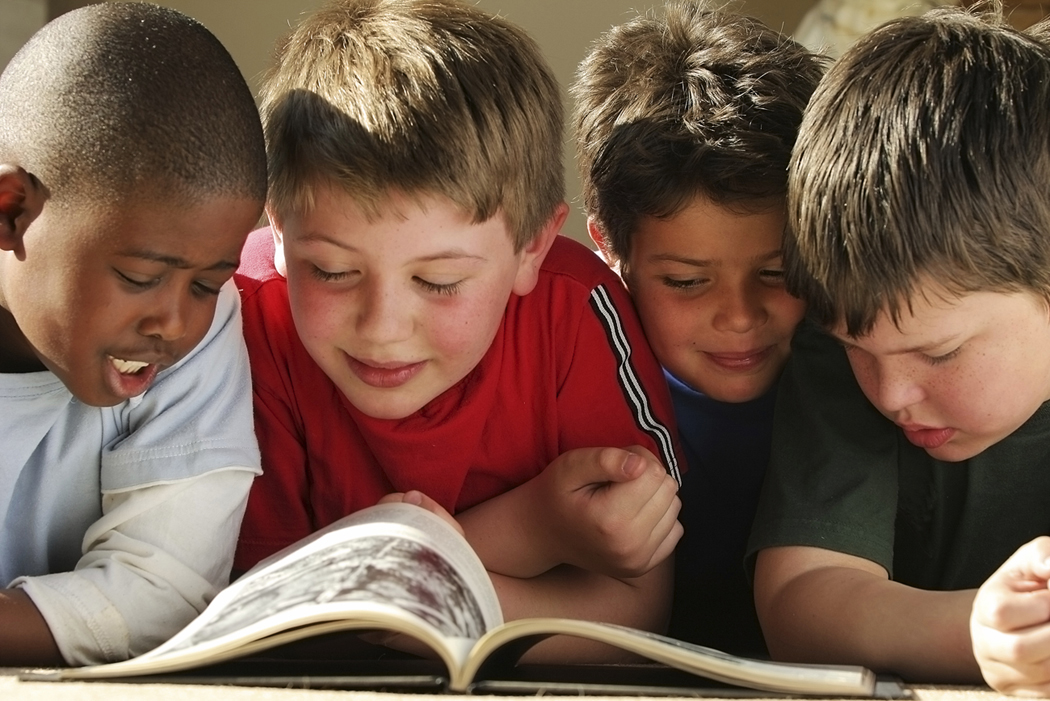Elementary School Education
Page Navigation
- Elementary School Education
- Elementary School List
- Early Childhood Education
- Elementary Mathematics
- Elementary Science
- Elementary Social Studies
- Elementary Reading and Language Arts
- Teaching and Learning Services
- Advanced Studies and Academic Excellence
- Career Technical and Adult Education
- English for Speakers of Other Languages (ESOL)
- Exceptional Student Education (ESE)
- Health and Physical Education
- Performing Arts
- Health and Physical Education
- STEM
- Visual Arts
- Summer Bridge
- World Languages
Elementary Reading and Language Arts
-

The Pinellas County Reading and Language Arts core instructional design incorporates the integration of reading, writing, listening, and speaking. Teachers provide literacy instruction based on the Florida’s Benchmarks for Excellent Student Thinking (B.E.S.T.) Standards to build knowledge-rich curricula that will nurture students by immersing them in the study of great works of literature, history, and the arts. These standards emphasize that literacy is not achievable merely through a skills-based approach to reading comprehension. During the Language Arts block, students engage in authentic literature, including titles from the B.E.S.T. and Civics suggested reading lists. Students build strength and stamina in writing by creating writing over both short- and long-periods of time about a variety of topics and texts. Students will engage in various writing instruction centered around the three types of writing: narrative, expository, and opinion/argumentative. Additionally, they will learn elaboration techniques, grammar, and the revising and editing process to become well-rounded authors.
Holly Slaughter, Elementary Reading & Language Arts Specialist
(727)588-6090
Email Elementary Reading/Language Arts
Language Arts Daily Components:
- Word Study - Explicit and meaningful instruction in phonics and other principles of how words are constructed.
- Close-In Study of Grade Level Complex Text – Teachers read text aloud, share the reading, and use multimedia to engage students in the reading and rereading of grade level text.
- Explicit Reading Instruction – Students are taught reading skills and strategies and given the chance to apply those skills and strategies in many ways: independent practice, with the guidance of the teacher, practice with peers, and through reflection.
- Explicit Writing Instruction – Students are taught critical writing skills and given time to practice those skills independently, with the guidance of the teacher, and with their peers.
- Vocabulary Instruction – Academic and domain-specific vocabulary words are taught in the context of reading and writing.
K-12 reading instruction aligns with Florida's Revised Formula for Success
6 + 4 + T1 +T2 + T3, which includes the following:
- Six components of reading: oral language, phonological awareness, phonics, fluency, vocabulary, and comprehension.
- Four types of classroom assessments: screening, progress monitoring/formative assessment, diagnostic, and summative assessment.
- Core instruction (Tier 1): is standards-aligned; includes accommodations for students with a disability, students with an Individual Educational Plan (IEP), and students who are English language learners; provides print-rich, explicit and systematic, scaffolded, and differentiated instruction; builds background and content knowledge; incorporates writing in response to reading; and incorporates the principles of Universal Design for Learning as defined in 34 C.F.R. 200.2(b}(2}(ii}.
- Immediate intervention (Tier 2): is standards-aligned; includes accommodations for students with a disability, students with an IEP, and students who are English language learners; provides explicit, systematic, small group teacher-led instruction matched to student need, targeting gaps in learning to reduce barriers to students' ability to meet Tier 1 expectations; provides multiple opportunities to practice the targeted skill(s} and receive feedback; and occurs in addition to core instruction.
- Immediate intensive intervention (Tier 3): is provided to students identified as having a substantial deficiency in reading; is standards-aligned; includes accommodations for students with a disability, students with an IEP, and students who are English language learners; provides explicit, systematic, individualized instruction based on student needs, one-on-one or very small group instruction with more guided practice, immediate corrective feedback, and frequent progress monitoring; and occurs in addition to core instruction and Tier 2 interventions. In accordance with Section 1008.25(4}(c}, F.S., students identified with a substantial reading deficiency must be covered by a federally required student plan, such as an IEP or an individualized progress monitoring plan, and receive intensive interventions from teachers who are certified or endorsed in reading. All students need opportunities to engage in integrated, interdisciplinary instruction with complex tasks that challenge them to apply foundational skills towards high-level thinking as they relate to complex texts.
PCS has partnered with Public Consulting Group (PCG) to create a customized curriculum to meet the demands of the B.E.S.T. Standards as well as evidence-based reading, writing, speaking, and listening approaches.
Pinellas Early Literacy Initiative
In the early grades, the standards emphasize explicit, systematic phonics instruction as the foundation of literacy. Decoding and fluency are essential to creating proficient readers. “Readers who have strong decoding skills can figure out unfamiliar words so quickly that the process requires no conscious effort,” says Dr. Holly Lane, University of Florida Literacy Institute. When decoding is effortless, a reader’s limited working memory is freed up, so the reader can focus on meaning.
The Pinellas Early Literacy Initiative (PELI) aims to improve kindergarten readiness rates and literacy proficiency among Pre-K and elementary school students. The Initiative focuses on kindergarten readiness by extending the science of reading into VPK and K-2 classrooms, where teachers have an opportunity to affect educational achievement through evidence-based instruction. The objective of PELI is to increase the number of students who are reading on grade level before they reach the third grade, when academic progress is assessed. By leveraging high quality professional development with instructional coaching for both Pre-K and K-2 teachers, early student literacy gaps will dissipate more rapidly, effectively preparing students for the more rigorous content of grades 3-5.
The Pinellas Early Literacy Initiative is supported through wide-ranging, specific partnerships with the Helios Education Foundation, the Pinellas Education Foundation, Pinellas County Schools, the Pinellas Early Learning Coalition, the University of Florida’s Lastinger Center, and other local partners supporting the Pinellas Early Literacy Initiative to achieve these outcomes.2021-2022 Cohort 2022-2023 Cohort 2023-2024 Cohort 2025-2026 Cohort Melrose Elementary Belleair Elementary Bay Point Elementary Fairmount Park Elementary Ponce de Leon Elementary Blanton Elementary Sandy Lane Elementary Ridgecrest Elementary Kings Highway Magnet Elementary Cross Bayou Elementary Lakewood Elementary New Heights Elementary Skycrest Elementary Dunedin Elementary Campbell Park Elementary Mount Vernon Elementary Lynch Elementary Maximo Elementary 74th Street Elementary Pinellas Park Elementary Lealman Avenue Elementary Woodlawn Elementary High Point Elementary Gulfport Elementary Pinellas Early Literacy S.P.R.O.U.T. (Supporting Phonics, Reading, Oral-language, & Understanding Text)
If your first-grade child has been offered SPROUT lessons, it means the teachers think he or she needs extra help with reading and writing. Proficient readers and writers develop early. For children whose literacy skills are just emerging, getting help as early as possible will make a big difference in learning. Strong reading and writing skills are essential for success in school and later life.
A SPROUT teacher has special training to find out exactly what your child finds hard about reading and writing. Your child’s SPROUT lessons will be based on what he or she knows and will be adapted to make it easy to learn. The teacher will provide your child an individual 30-minute lesson every day for 12 to 20 weeks. In that time, you should see your child’s reading and writing improve quickly. This new learning usually helps children feel more confident about classroom work, too.
In Pinellas County, SPROUT serves 8 schools as a part of a Science of Reading intervention outlined in the Bridging the Gap Plan. Those elementary schools are: Campbell Park Elementary, Fairmount Park Elementary, Gulfport Elementary, High Point Elementary, Lakewood Elementary, Maximo Elementary, Melrose Elementary, & Sandy Lane Elementary.
MyOn
MyOn is a personalized digital library at every student’s fingertips. Students can access MyOn at home through Clever. For more information, please go to https://www.renaissance.com/products/myon//
Amira
Amira is a computer-adaptive learning program available to all students. Engaging, research-based assessments and interactive instruction respond to the individual needs of each student. As students read aloud, Amira delivers in -the-moment tutoring and micro-interventions to reinforce foundational skills and to promote growth. In addition to computer-based instruction, a rich library of thousands of supplemental lessons is included. Students can use Amira both at school and at home. Amira provides real-time results that allow teachers to monitor progress and help further differentiate instruction. Students can access Amira through Clever. For more information, please go to https://amiralearning.com/.
Parent Guides by Grade Level Benchmarks for Excellent Student Thinking (B.E.S.T.)
Benchmarks of Excellent Student Thinking (B.E.S.T.) www.cpalms.org





